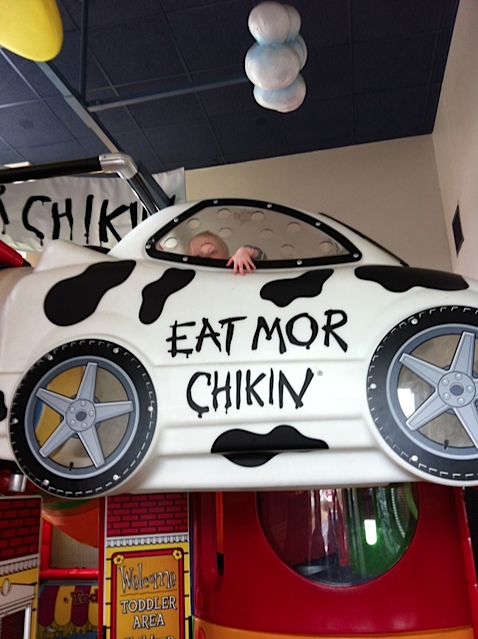Last weekend we took the family to Myrtle Beach, land of golf, outlet malls and lazy rivers. After hitting a kids museum, a pizza arcade and the Ripley’s Aquarium I asked Jack, our three-year-old, where he wanted to eat dinner and he emphatically replied ‘Chick-Fil-A’ because of the playground. No wonder I dream about the place.
Being a food safety nerd, we do a bunch of handwashing after visiting the play area and before jumping into our meals. A friend of mine who runs one told me the staff also disinfect the whole room using a bunch of different sanitizers every night. Not risk elimination, but definitely reduction.
According to USA Today, a mother of four has embarked on a national crusade to reduce illness risks associated restaurant playgrounds, including suggesting regulations on sanitation.
Arizona’s most populous county is looking at new regulations to safeguard restaurant play areas after one mother here discovered unsanitary conditions when her 3-year-old wanted to play at a nearby McDonald’s.Maricopa County health officials are looking at expanding their oversight of restaurant cleanliness to playgrounds."This is a giant step in the right direction," said Erin Carr-Jordan, 37, a mother of four with a doctorate in developmental psychology who lives in this Phoenix suburb.The proposal would require sanitizing of those areas after every shift, detailed cleaning protocols, permanent signs encouraging children’s hand washing before meals and immediate closure of the play areas "when vomiting and/or fecal accidents occur."But getting those changes into law isn’t a sure thing. The approval process takes months, the county supervisor she is working with leaves office at the end of the year and a candidate for another supervisor’s seat is president of the Arizona Restaurant Association.
Carr-Jordan is getting support from the county’s public-health director, Dr. Robert England (not to be confused with Robert Englund – ben).
"It’s just common sense. You don’t want to facilitate something that’s going to make kids’ hands filthy dirty right before they handle food," England said. "But we also don’t want to do anything that discourages physical activity. For some, this is the best playground equipment available."
England said he hasn’t read the proposed health-code changes but would support "reasonable" play-equipment-cleanliness requirements.The Arizona Restaurant Association would prefer advisory, not mandatory, cleaning standards for play areas."Our restaurants do everything in their power to make sure these locations are clean," said Sherry Gillespie, the association’s government relations manager.
The mother’s outrage started about a year ago when Carr-Jordan’s son asked to go on the slide at a Tempe, Ariz., McDonald’s."I saw filth and grime coupled with clumps of dirt, matted hair and rotting food. The entire structure was riddled with swear words and gang signs," she said.
The Arizona Restaurant Association would prefer advisory, not mandatory, cleaning standards for play areas.
"Our restaurants do everything in their power to make sure these locations are clean," said Sherry Gillespie, the association’s government relations manager.
While I’m not a fan of regulation just because, Gillespie’s comments sound like ‘just trust us’ to me. Everything in their power is pretty empty, if there are cleaning and sanitizing guidelines that folks are following, tell people what they are. My Chick-Fil-A friend showed me what he does and that was good enough for me.

